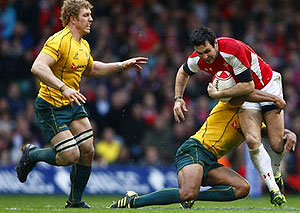
Everybody watching the international friendly between Manu Samoa and the Wallabies would have been impressed by the sheer passion exhibited by the plucky Samoan underdogs.
This was a fantastic opportunity for the tiny minnows of rugby to step up and maximise their peculiar Islander rugby brand.
However, it didn’t end there. In what many pundits have labelled a ‘boil-over’, they even finished the match having scored more points than the men in gold which, technically speaking, was a ‘loss’ for the Qantas Wallabies One Team 2011.
There has been a great deal of vexation on this site and others over the respective points differential at full-time.
Of course, if the game had gone on for another half hour the Wallabies would probably have won the match, but in today’s world of instant gratification that fact has been completely overlooked to focus entirely on the negative side of the equation.
Surely we have to ask ourselves if the Wallaby message is being lost in translation.
Are we as the consumers of rugby union in this country ignoring the strategic overview developed painstakingly by John O’Neill and the Australian Rugby Union?
Rather than go over old ground by focusing on some individual performance paradigm which never addresses the holistic synergies of the group structure, we should look to consider the position the Qantas Wallabies are in at this phase of the 2011 Rugby World Cup journey.
Under head coach Robbie Deans the elite playing roster has implemeted this proactive relational mindset. Time does not stand still and despite the result against Samoa, the individual Wallaby is always thinking 60/60/24/7/365.
There has been much talk of attitudinal complacency, but as Robbie Deans said to an AAP media correspondent: “I don’t know what other people were thinking, but we certainly weren’t (complacent) … and we talked about that – internally and externally. We’ve obviously reviewed the game – now we’re looking ahead.”
This is the critical aspect so many posters have ignored. Sure, the ‘final score’ is possibly the only statistic that many rugby consumers consider at first glance, but what is more important is the seamless integration the Qantas Wallabies have built between the internal and external communication channels.
Moving forwards, or “looking ahead” to the match against the Springboks, the challenge will be to re-purpose the resources of the group without divolving too much in the way of summative evaluation in respect of the Samoa game or losing that integrated culture.
“It’s more about the fact that we lost. It’s more about the fact that we didn’t play well,” he said. “Had we not done either of those two things, the reaction may have been different.”
Robbie is again on the money in this instance.
The reaction may well have been different. This is professional sport after all. Opinions are subjective. What would we be thinking if they had done only one of those things, let alone both?
This is open to debate. We pride ourselves in this country knowing that the Qantas Wallabies are the only side in international rugby that can engage interactively for unplanned-for results. We apply the proverb “a watched pot never boils” not only to our game preparation management, but also our capacity to seize the moment when it arrives.
Even Wallaby captain Rocky Elsom has owned the reality of the criticism generated by the rugby consumer: “I would be surprised if everyone was happy about how it went. As far as I’m concerned, guys get given a jersey to do a job and no other reason.
“I don’t know how else to respond to that,” he said. “We don’t have a habit of talking about those sorts of comments as a group. Whether or not that’s motivation for guys – that’s an individual thing.”
So having identified the job’s variables, the match group develops mixed strategies to internalise the external statements and contain that within a holistic, logic-based paradigm.
There’s no point in incorporating these messages into the overall view without quantifiable parameters – after all, those psychological processes are individual, not necessarily a group-wide competence with the appropriate rugby playing kpi’s structured within it.
Having addressed that, Rocky analysed the dynamics of the group: “I feel like the guys are in a reasonable head space moving forward,” he said.
“As bad as it was, it’s important that everyone sticks together a little bit. We spent a lot of time as a group afterwards – there are things that you can do something about and then there’s everything else. (My message was) don’t dwell on the things that don’t help.”
Having an understanding of what the group can control is about building that circle of influence. Think internal. Think external. Think about what can be controlled. But don’t think about all three at the same time.
“We got to turn our minds onto the South Africans this weekend and respond as well as we can.”
Re-engineer and re-purpose. Focus on what is ahead. A very simple message. A rugby brand that can re-purpose correctly will (at some undefined point in the future) be able to dynamically unleash itself.
The journey to the World Cup is multi-phased, not linear. Think integrated. It seems staggering, but it’s true! The Qantas Wallabies are engaged by the journey and are careful to select their macro inputs.
As consumers of the Wallabies’ product, so should we.





























































































